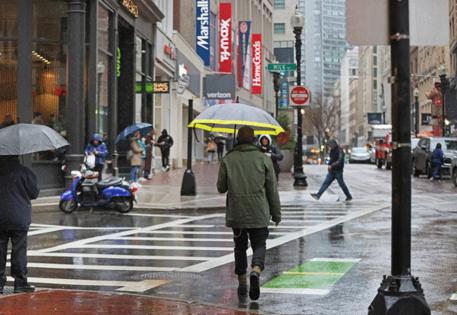Boston Police official says Mass and Cass spillover driving spike in violence, drug use downtown, on Common
Published in News & Features
BOSTON — A high-ranking Boston Police official attributed the uptick in violence, open-air drug use and other deviant behavior seen downtown and on Boston Common over the past year to spillover from the longstanding but now defunct Mass and Cass encampment.
Boston Police Deputy Superintendent Dan Humphreys said BPD is already in the middle of a “very deliberate pivot” to tackle the “pockets of overflow throughout the city” that resulted from last year’s crackdown at Mass and Cass — which is what he saw as the main issue a Tuesday City Council hearing on downtown safety was aiming to address.
“We are doing a very intentional redeployment of officers into these areas of community concerns,” Humphreys said. “What we are doing is we’re endeavoring to significantly increase our visibility, and put the same effort that we put into reducing our violent crime and victimization rates into addressing quality of life issues, specifically addressed at the fear of crime that people are feeling.”
Mentioning other hot spots — like Andrew Square in South Boston, Mattapan Square, and Nubian Square in Roxbury — that have seen heightened drug activity, squatting and violence since the city removed the tents at Mass and Cass last fall, Humphreys said, “We don’t need to guess where the problem is.”
“People are telling us,” Humphreys said. “This is where we’re going to put people and it’s an all hands on deck approach.”
He said that the department has seen “immediate positive feedback” where those foot patrols been deployed.
Humphreys mentioned, however, that a major part of the problem comes from the “power of fentanyl,” where people hooked on the illicit drug have to “get high like five times a day” — “It takes you over,” he said, and there are dealers who prey on that.
City Councilor Ed Flynn, who filed an order for the hearing in October but began broaching concerns about escalating violence in the area following a near-fatal stabbing that occurred in Downtown Crossing last August, said the issue stems, in part, from a criminal justice system where drug dealers are arrested by the police but later released back on the streets by the courts.
Flynn had invited a representative from the Suffolk County District Attorney’s office to testify, but the invitation was declined.
“When someone commits a crime and is found guilty, they should be sentenced to either jail or prison,” Flynn said. “We can’t have people back out on the streets preying on people … I think we need to have a criminal justice system that respects victims and residents.”
Flynn’s comments were repeated by some residents who testified at the day’s hearing and joined representatives from the downtown business community in speaking to what they saw as a sharp uptick in not only violent crime and drug use over the past year, but safety concerns driven by speeding scooters and mopeds.
Katherine Kennedy, a Beacon Hill resident and mother of two small children including a 7-month-old, said drug use is so rampant in the area that she’s been forced to carry a “sharps container” in her diaper bag.
“I pass discarded needles as I walk my 5-year-old to her public school every day,” Kennedy said. “Having to keep needles away from my kids as I walk them to preschool is unacceptable.”
Over the past decade that she’s lived in Beacon Hill, Kennedy said she’s never seen that area and the surrounding downtown neighborhoods in Boston “this overrun with drug paraphernalia or folks in crisis.”
“Boston and the surrounding region is not doing enough to actually disrupt the cycle of addiction that has led to this crisis,” Kennedy said. “We keep moving the problem instead of solving it and we need actual solutions.”
_____
©2024 MediaNews Group, Inc. Visit at bostonherald.com. Distributed by Tribune Content Agency, LLC.







Comments